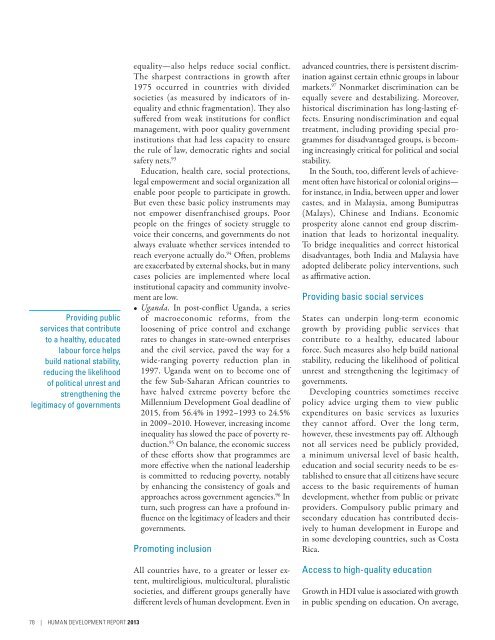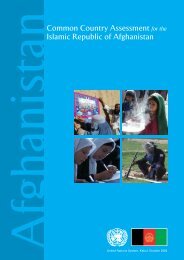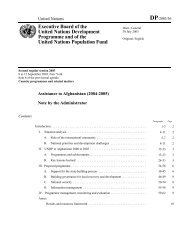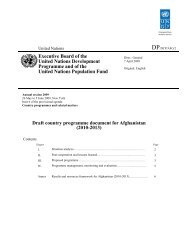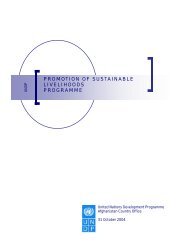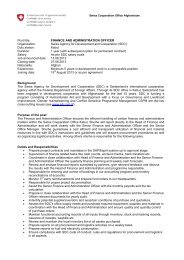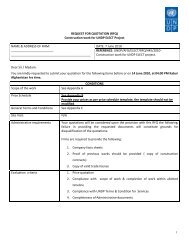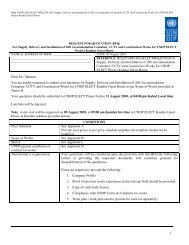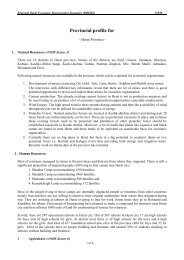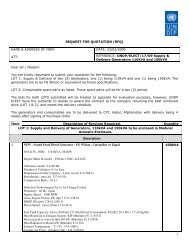E N S W - Human Development Reports - United Nations ...
E N S W - Human Development Reports - United Nations ...
E N S W - Human Development Reports - United Nations ...
You also want an ePaper? Increase the reach of your titles
YUMPU automatically turns print PDFs into web optimized ePapers that Google loves.
Providing public<br />
services that contribute<br />
to a healthy, educated<br />
labour force helps<br />
build national stability,<br />
reducing the likelihood<br />
of political unrest and<br />
strengthening the<br />
legitimacy of governments<br />
equality—also helps reduce social conflict.<br />
The sharpest contractions in growth after<br />
1975 occurred in countries with divided<br />
societies (as measured by indicators of inequality<br />
and ethnic fragmentation). They also<br />
suffered from weak institutions for conflict<br />
management, with poor quality government<br />
institutions that had less capacity to ensure<br />
the rule of law, democratic rights and social<br />
safety nets. 93<br />
Education, health care, social protections,<br />
legal empowerment and social organization all<br />
enable poor people to participate in growth.<br />
But even these basic policy instruments may<br />
not empower disenfranchised groups. Poor<br />
people on the fringes of society struggle to<br />
voice their concerns, and governments do not<br />
always evaluate whether services intended to<br />
reach everyone actually do. 94 Often, problems<br />
are exacerbated by external shocks, but in many<br />
cases policies are implemented where local<br />
institutional capacity and community involvement<br />
are low.<br />
• Uganda. In post-conflict Uganda, a series<br />
of macroeconomic reforms, from the<br />
loosening of price control and exchange<br />
rates to changes in state-owned enterprises<br />
and the civil service, paved the way for a<br />
wide-ranging poverty reduction plan in<br />
1997. Uganda went on to become one of<br />
the few Sub-Saharan African countries to<br />
have halved extreme poverty before the<br />
Millennium <strong>Development</strong> Goal deadline of<br />
2015, from 56.4% in 1992–1993 to 24.5%<br />
in 2009–2010. However, increasing income<br />
inequality has slowed the pace of poverty reduction.<br />
95 On balance, the economic success<br />
of these efforts show that programmes are<br />
more effective when the national leadership<br />
is committed to reducing poverty, notably<br />
by enhancing the consistency of goals and<br />
approaches across government agencies. 96 In<br />
turn, such progress can have a profound influence<br />
on the legitimacy of leaders and their<br />
governments.<br />
Promoting inclusion<br />
All countries have, to a greater or lesser extent,<br />
multireligious, multicultural, pluralistic<br />
societies, and different groups generally have<br />
different levels of human development. Even in<br />
advanced countries, there is persistent discrimination<br />
against certain ethnic groups in labour<br />
markets. 97 Nonmarket discrimination can be<br />
equally severe and destabilizing. Moreover,<br />
historical discrimination has long-lasting effects.<br />
Ensuring nondiscrimination and equal<br />
treatment, including providing special programmes<br />
for disadvantaged groups, is becoming<br />
increasingly critical for political and social<br />
stability.<br />
In the South, too, different levels of achievement<br />
often have historical or colonial origins—<br />
for instance, in India, between upper and lower<br />
castes, and in Malaysia, among Bumiputras<br />
(Malays), Chinese and Indians. Economic<br />
prosperity alone cannot end group discrimination<br />
that leads to horizontal inequality.<br />
To bridge inequalities and correct historical<br />
disadvantages, both India and Malaysia have<br />
adopted deliberate policy interventions, such<br />
as affirmative action.<br />
Providing basic social services<br />
States can underpin long-term economic<br />
growth by providing public services that<br />
contribute to a healthy, educated labour<br />
force. Such measures also help build national<br />
stability, reducing the likelihood of political<br />
unrest and strengthening the legitimacy of<br />
governments.<br />
Developing countries sometimes receive<br />
policy advice urging them to view public<br />
expenditures on basic services as luxuries<br />
they cannot afford. Over the long term,<br />
however, these investments pay off. Although<br />
not all services need be publicly provided,<br />
a minimum universal level of basic health,<br />
education and social security needs to be established<br />
to ensure that all citizens have secure<br />
access to the basic requirements of human<br />
development, whether from public or private<br />
providers. Compulsory public primary and<br />
secondary education has contributed decisively<br />
to human development in Europe and<br />
in some developing countries, such as Costa<br />
Rica.<br />
Access to high-quality education<br />
Growth in HDI value is associated with growth<br />
in public spending on education. On average,<br />
78 | HUMAN DEVELOPMENT REPORT 2013


